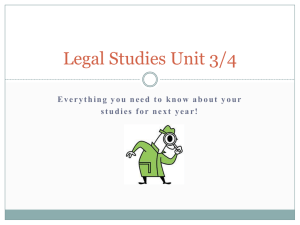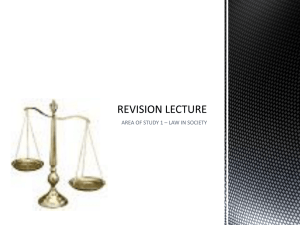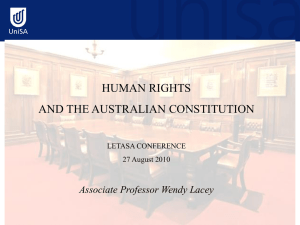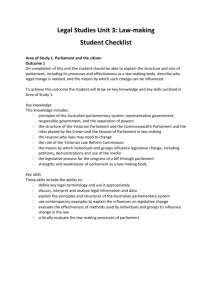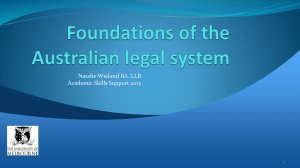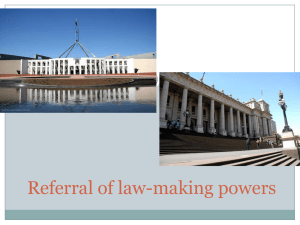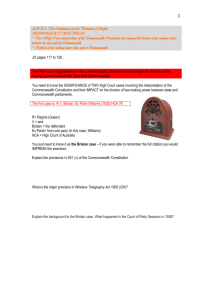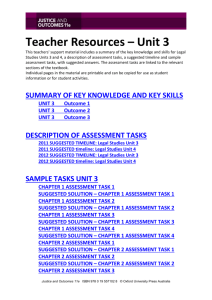UNIT 3 LEGAL STUDIES TIMELINE
advertisement
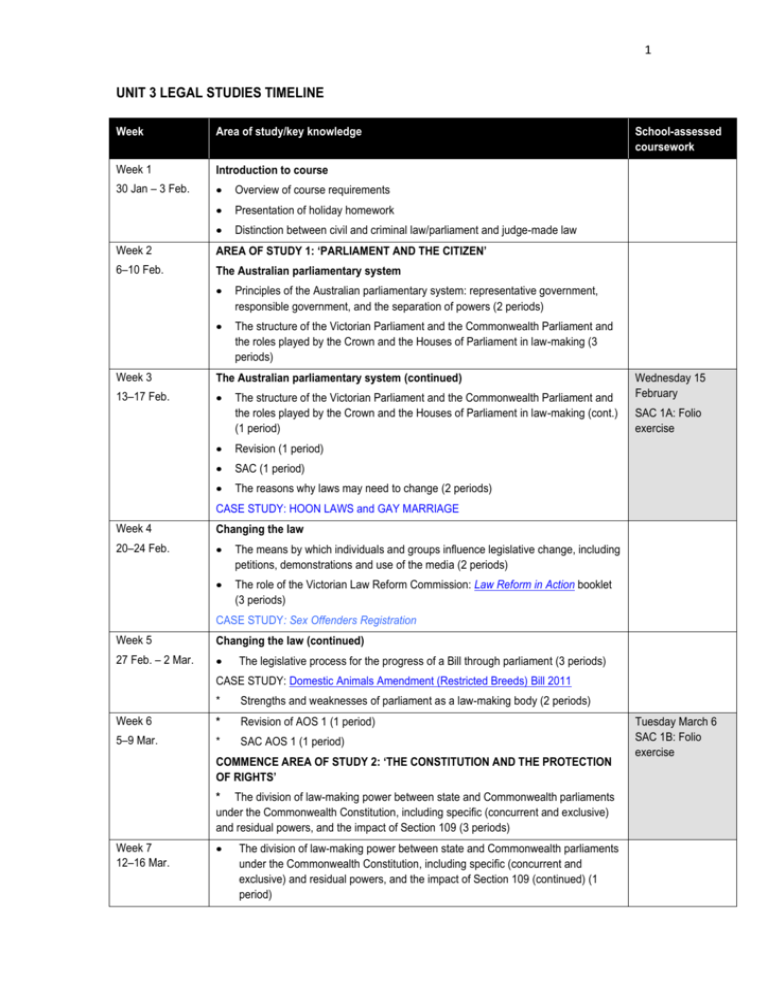
1 UNIT 3 LEGAL STUDIES TIMELINE Week Area of study/key knowledge Week 1 Introduction to course 30 Jan – 3 Feb. Overview of course requirements Presentation of holiday homework Distinction between civil and criminal law/parliament and judge-made law Week 2 AREA OF STUDY 1: ‘PARLIAMENT AND THE CITIZEN’ 6–10 Feb. The Australian parliamentary system Principles of the Australian parliamentary system: representative government, responsible government, and the separation of powers (2 periods) The structure of the Victorian Parliament and the Commonwealth Parliament and the roles played by the Crown and the Houses of Parliament in law-making (3 periods) Week 3 The Australian parliamentary system (continued) 13–17 Feb. The structure of the Victorian Parliament and the Commonwealth Parliament and the roles played by the Crown and the Houses of Parliament in law-making (cont.) (1 period) Revision (1 period) SAC (1 period) The reasons why laws may need to change (2 periods) School-assessed coursework Wednesday 15 February SAC 1A: Folio exercise CASE STUDY: HOON LAWS and GAY MARRIAGE Week 4 Changing the law 20–24 Feb. The means by which individuals and groups influence legislative change, including petitions, demonstrations and use of the media (2 periods) The role of the Victorian Law Reform Commission: Law Reform in Action booklet (3 periods) CASE STUDY: Sex Offenders Registration Week 5 Changing the law (continued) 27 Feb. – 2 Mar. The legislative process for the progress of a Bill through parliament (3 periods) CASE STUDY: Domestic Animals Amendment (Restricted Breeds) Bill 2011 * Strengths and weaknesses of parliament as a law-making body (2 periods) Week 6 * Revision of AOS 1 (1 period) 5–9 Mar. * SAC AOS 1 (1 period) COMMENCE AREA OF STUDY 2: ‘THE CONSTITUTION AND THE PROTECTION OF RIGHTS’ * The division of law-making power between state and Commonwealth parliaments under the Commonwealth Constitution, including specific (concurrent and exclusive) and residual powers, and the impact of Section 109 (3 periods) Week 7 12–16 Mar. The division of law-making power between state and Commonwealth parliaments under the Commonwealth Constitution, including specific (concurrent and exclusive) and residual powers, and the impact of Section 109 (continued) (1 period) Tuesday March 6 SAC 1B: Folio exercise 2 Week 8 Restrictions imposed by the Commonwealth Constitution on the law-making powers of the state and Commonwealth parliaments (1 period) The process of change by referendum under Section 128 of the Commonwealth Constitution and factors affecting its likely success (3 periods) The way in which one successful referendum changed the division of law-making powers (3 periods) 19–23 Mar. CASE STUDY: The 1967 Referendum Week 9 The role of the High Court in interpreting the Commonwealth Constitution (2 periods) The significance of two High Court cases involving the interpretation of the Commonwealth Constitution in terms of their impact on the law-making power of the state and Commonwealth parliaments (3 periods) 26 Mar. – 30 Mar. CASE STUDY: The Tasmanian Dam Case The significance of two High Court cases involving the interpretation of the Commonwealth Constitution in terms of their impact on the law-making power of the state and Commonwealth parliaments (continued) (2 periods) CASE STUDY: Brislan case 31 Mar – 15 Apr. Mid-semester break Week 10 16–20 Apr. Week 11 The capacity of the states to refer law-making power to the Commonwealth Parliament (1 period) Revision (1 period) SAC (1 period) The means by which the Commonwealth Constitution protects rights, including structural protection, express rights, and implied rights (2 periods) The means by which the Commonwealth Constitution protects rights, including structural protection, express rights, and implied rights (2 periods) The significance of one High Court case relating to the constitutional protection of rights in Australia (3 periods) 23–27 Apr. Wednesday18 April SAC 2A: Structured questions CASE STUDY: The Roach Case Week 12 30 Apr – 4 May CASE STUDY: The Roach Case Week 13 The significance of one High Court case relating to the constitutional protection of rights in Australia (2 periods) Australia’s constitutional approach to the protection of rights and the approach adopted in one of the following countries: Canada, New Zealand, South Africa, or the United States of America (3 periods) Australia’s constitutional approach to the protection of rights and the approach adopted in one of the following countries: Canada, New Zealand, South Africa, or the United States of America (continued) (2 periods) Revision (1 period) SAC (1 period) 7–11 May Thursday 10 May SAC 2B: Structured questions 3 Week 14 AREA OF STUDY 3: ‘ROLE OF THE COURTS IN LAW-MAKING’ 14–18 May The ability of judges and courts to make law (2 periods) The operation of the doctrine of precedent (3 periods) CASE STUDY: When Playtime Causes Injury Week 15 Reasons for interpretation of statutes by judges (2 periods) 21–25 May Effects of statutory interpretation by judges (2 periods) CASE STUDY: The Chroming Case * Strengths and weaknesses of law-making through the courts (1 period) Week 16 Strengths and weaknesses of law-making through the courts (1 period) 28 May – 1 June The relationship between courts and parliament in law-making (2 periods) Thursday 31 May SAC 3: Test CASE STUDY: Trigwell’s Case and Native Title Revision (1 period) SAC (1 period) Week 17 BEGIN UNIT 4 UNIT 4 4–8 June Area of Study 1: ‘Dispute resolution methods’ Outcome 1 Dispute resolution methods used by courts and VCAT, including mediation, conciliation, arbitration and adjudication The reasons for a court hierarchy Original and appellate jurisdictions of the Victorian Magistrates’ Court, County Court, and Supreme Court (Trial Division and Court of Appeal) Describe and evaluate the effectiveness of institutions and methods for the determination of criminal cases and the resolution of civil disputes HOMEWORK DUE DATES Tuesday Glossary test Thursday Media folio Revision book checked Every lesson Read, annotate and three point page summary of chapter that we are about to study. Exam type question (4 square round robin).
